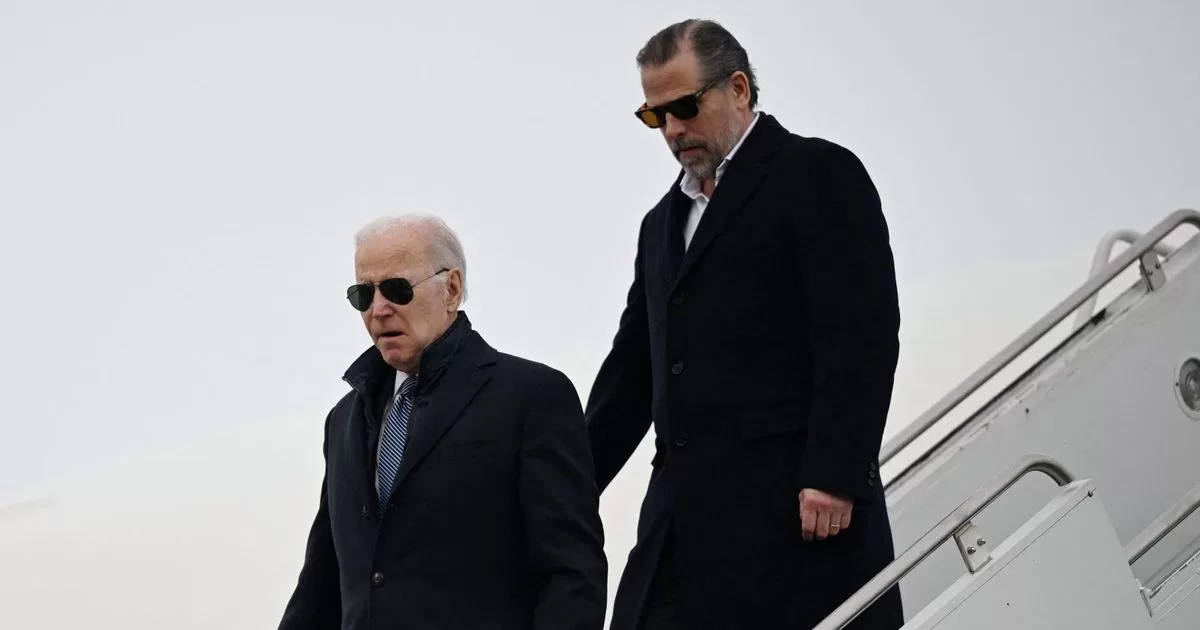At Camp David, as in the great moments of American diplomacy, President Joe Biden received this Friday the Prime Minister of Japan, Fumio Kishida, and the President of South Korea, Yoon Suk Yeol, to open what they have called ” a new era of cooperation” trilateral. Biden has made an effort to take advantage of the improving relations between Seoul and Tokyo and create a common front that serves as a counter to the Chinese hegemony in Asia and the threat of North Korea. The three leaders have reached security agreements that arouse suspicion in Beijing.
Biden has insisted on the vocation of permanence of the alliance: “It is not about a day, a week or a month. It’s about decades and decades of relationships that we’re building.” It is a “forever” relationship, as he has said, emphasizing the “historical” character that, in his opinion, the summit has had. the three leaders have signed a declaration, the Camp David Spirit, in which they outline the specific agreements, but in which they also denounce what they consider recent “dangerous and aggressive behavior” by the Government of Beijing in relation to “illicit maritime claims in the South China Sea”.
Washington maintains that the bilateral summit is not against anyone. “This summit has not been about China,” Biden has said, and a similar message has been expressed by Kishida. But China is taken for granted, and not only because of the mentions in the final declaration. This was already revealed this week by the spokesman for the Ministry of Foreign Affairs and this wednesday the Global Times, in the orbit of the Chinese Communist Party, maintained that the three countries are forming “a mini-NATO structure that will be destructive to regional security, complicating the situation with more conflicts,” citing Chinese foreign affairs experts.
The United States flatly rejects this approach: “It is not a NATO for the Pacific. We have already said it. We will continue to insist on it, as will Japan and Korea,” National Security Adviser Jake Sullivan said this Friday.
“Strengthening the ties between our democracies has been a priority for me for a long time,” Biden said at the beginning of the summit. “Our countries are stronger and the world will be safer if we stick together,” he added. In the appearance after the meeting, Biden stressed that South Korea and Japan “are capable and indispensable allies.” “The commitment of the United States to both countries is iron,” he stressed.
“Our trilateral partnership is opening a new chapter which, in my opinion, is of great importance,” Yoon said. “Increased coordination between Korea, the US and Japan requires a stronger institutional foundation. In addition, the challenges that threaten regional security must be addressed with a greater commitment to joint work”, added the South Korean president, who also described the day as a “historic day”.
Join EL PAÍS to follow all the news and read without limits.
subscribe
The Japanese Prime Minister, Fumio Kishida, agreed that “history” was being made with the summit and that “the international community is at a crucial moment.” The leaders have expressly referred to geopolitical competition, the climate crisis, Russia’s war against Ukraine and nuclear provocations as context.
The three leaders have attended the summit without a tie, according to the meeting location, the rustic presidential residence of Camp David, in the mountains of Maryland, just over an hour away from Washington.
military maneuvers
The central core of the new trilateral relationship is security issues, although there are also economic, technological, health aspects and an early warning mechanism for supply chain interruptions. The leaders undertake to carry out a multi-year planning process for military maneuvers in all areas: air, land, sea, submarine, cybernetic, etc., “bringing trilateral defense cooperation to unprecedented levels”, has said Biden.
The three countries will step up information sharing, including on North Korea’s missile launches, cyber activities, and laundering of cryptocurrency. “Most importantly, we have all committed to consulting with each other and responding swiftly to threats against any of our countries, whatever their origin. That means that we will have a hotline to share information and coordinate our responses whenever there is a crisis in the region or that affects any of our countries,” said the President of the United States.
Biden has also pointed out the shared commitment to “maintain peace and stability in the Taiwan Strait and to face economic coercion” and defend the peaceful resolution of disputes. in the South China Sea. In addition, he has referred to North Korea’s “possible arms transfer in support of Russia’s brutal war against Ukraine” as the United States suspects Pyongyang may provide missile technology to Moscow.
The president of the United States has also praised the courage of Yoon and Kishida in strengthening relations between their two countries. Both are Washington’s main allies in the region and the fact that they did not understand each other has always been a problem for the United States.
Japan and South Korea have maintained relations of suspicion, distrust and coldness that come from the 35 years that the Korean peninsula was a Japanese colony and from World War II, particularly due to the offense of sexual slavery. Tens of thousands of women were tricked or forced into prostitution in Imperial Japanese Army brothels.
Since coming to power, Yoon has worked to improve relations with Japan. The common threat of North Korea and Russia’s invasion of Ukraine have helped bring two natural allies in the region closer together. Biden wants this improvement to be consolidated and maintained over time and believes that a close trilateral relationship can contribute to this. On his first trip to Asia, in May 2022, Biden visited both Seoul and Tokyo, sparking Chinese unrest.
What has not been set as an explicit goal, not even in the long term, a formal trilateral alliance. “We have strong and deep bilateral partnerships going back decades with both Japan and the Republic of Korea. We would like them to continue to strengthen their cooperation and for this three-way cooperation to deepen and become institutionalized”, he said.
The summit is the first to be held at the Camp David residence, a prominent historical setting for US diplomacy, since 2015, when then-President Barack Obama received the six nations of the Gulf Cooperation Council to assure them that the United States was committed with your safety.
Biden thus highlights the importance he gives to the Indo-Pacific region, his relations with these two leaders and their trilateral cooperation. “This is the first summit that I have held at Camp David as president,” he stressed. “I can’t think of a more appropriate place to start next year, our next year of cooperation, than a place that has long symbolized the power of new beginnings and new possibilities. In the months and years ahead we will continue to seize those possibilities together, unwavering in our unity and unmatched in our determination”, he concluded.
Follow all the international information on Facebook and Twitteror in our weekly newsletter.



